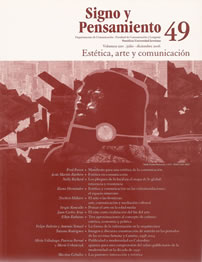Abstract
The article describes the new forms for resistance in the economic and semiotic grids of the capitalist continuum. Empire, with its globalized signs of cross-border nature, has replaced the old symbols of deeply rooted traditions and belonging. It is a ‘trans-semiotic’ grid of connectivity and ‘non-differentiation’, marked by the perpetual movement of meanings and the speed of exchanges. As a proposal, it moves forward in the concept of ‘hybridity’, through the problem of ‘cultural tradition’, which ends up bringing about ruptures between what is global and what is local through the transfer of meanings from one chain to another. In spite of those who insist that ‘local’ is not out of the global order, the “no place” opposes “all places” of the empire. This figure represents the liberating conditions of crowds, which is “to be against in all places”, a characteristic that is not local –as a place– but of production of locality, that is, non belonging and permanent ‘de-inscription’.This journal is registered under a Creative Commons Attribution 4.0 International Public License. Thus, this work may be reproduced, distributed, and publicly shared in digital format, as long as the names of the authors and Pontificia Universidad Javeriana are acknowledged. Others are allowed to quote, adapt, transform, auto-archive, republish, and create based on this material, for any purpose (even commercial ones), provided the authorship is duly acknowledged, a link to the original work is provided, and it is specified if changes have been made. Pontificia Universidad Javeriana does not hold the rights of published works and the authors are solely responsible for the contents of their works; they keep the moral, intellectual, privacy, and publicity rights.
Approving the intervention of the work (review, copy-editing, translation, layout) and the following outreach, are granted through an use license and not through an assignment of rights. This means the journal and Pontificia Universidad Javeriana cannot be held responsible for any ethical malpractice by the authors. As a consequence of the protection granted by the use license, the journal is not required to publish recantations or modify information already published, unless the errata stems from the editorial management process. Publishing contents in this journal does not generate royalties for contributors.


